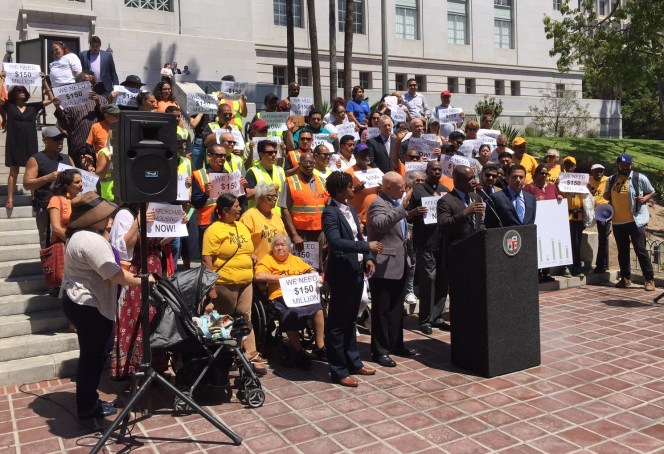The Los Angeles City Council Planning and Land Use Management (PLUM) Committee unanimously approved a proposed new city Affordable Housing Linkage Fee. If approved by the full council, new development would pay an estimated $100 million annually into the city's affordable housing trust fund, resulting in an estimated 1,500 new and protected affordable units each year, according to the staff report.
The linkage fee has been championed by Mayor Eric Garcetti, and was included in the city's adopted Comprehensive Homelessness Strategies Report. Housing linkage fees on development are already in place in numerous cities from Boston to San Francisco to West Hollywood.
Before the PLUM Committee hearing, advocates rallied on the steps of city hall. Councilmembers José Huizar, Marqueece Harris-Dawson, and Mike Bonin were joined by clergy, housing, and homeless advocates, and spoke to the importance of approving the fee to begin to turn the tide on current crises of homelessness and affordability. Signs displayed called for "affordable housing now" and "we need $150 million."
Over the course of the nearly five-hour hearing, with more than 35 speakers on each side, public comment was split on the proposed fee.
Affordable housing advocates urged approval, telling horrific anecdotes about L.A.'s "unprecedented" housing crisis. Some blamed luxury housing developers for today's affordability crisis, urging that they "pitch in their fair share" to solve the problem.
Business and development interests urged a "no" vote, predicting escalating housing costs, lost jobs, and an "immediate recession." Some asserted that linkage fee costs would just be passed along to homeowners/renters living in new housing, while only a lucky few who "win the lottery" would benefit from the new affordable housing built.
Construction workers spoke on both sides of the issue.
The linkage fee issue has been divisive; a June PLUM hearing was similarly divided. While the fee could make some dent in a huge affordable housing shortfall, it represents only a partial solution, with much more still needed.
There is strong support for the fee among community-based non-profits, including L.A. Community Action Network, Alliance for Community Transit, and many that develop non-profit housing.
Some supply-side housing advocates, including Abundant Housing, have opposed a linkage fee, instead encouraging raising monies through a tax on short term rentals (such as AirBnB), a progressive real estate transfer fee, and leasing of city-owned sites. In addition to funding, Abundant Housing encourages legislative solutions to make it easier to build more homes.
PLUM Committee members present acknowledged the fraught situation.
Councilmembers Mitch Englander and Bob Blumenfield each stated that they agreed with nearly all of the points made by both sides. Councilmember Harris-Dawson, a strong supporter of the linkage fee, spoke of the lack of good choices: "It's not a great choice to tax the activity that we want to stimulate." In contrast, though, Harris-Dawson described keeping the status quo as "a disastrous choice," noting that his South L.A. district has long suffered from a lack of private housing development.
Responding to council concerns expressed at the June hearing, the city's Housing and Planning Departments crafted several potential options to create tiered linkage fees, what the city is calling "Geographic-Based Fee Variability." The varied fees try to get away from a "one size fits all" approach, tailoring fees to respond to different development climates in different parts of the city.
Councilmember Huizar proposed, and the committee ultimately approved, the staff report's option C, which tiers fees based on Community Plan Areas. Residential fees would be from $8-$15/sqft. Commercial fees would be $3-$5/sqft.
Various committee members amended the proposal in ways that, to some extent, would water down the fees:
- Councilmember Curren Price proposed that the "SLATE-Z" empowerment zone be exempt from fees for three years, as the empowerment zone designation is encouraging commercial development.
- Councilmember Blumenfield proposed seven amendments, including: a $3/sqft fee on projects that result in a net loss of housing units, adding "missing middle" "moderate workforce housing" to spending plans, taxing small multi-family development in high market areas, phasing in the fee over two years, and greater reporting back on fee impacts.
- Councilmember Englander proposed exempting all hospitals and all non-profits.
The committee voted unanimously to approve the linkage fee, with the SLATE-Z exemption, net loss of units fee, and all hospital construction exempt. The schedule approved is that the linkage fee would be phased in over the course of a year, with a half fee in place after six months, then full fees at one year.
The proposal will be heard next at the City Council's Housing Committee, then at the full City Council. If approved by council, the City Attorney would then draft an ordinance that would need to be adopted by the council.
See additional Affordable Housing Linkage Fee coverage at KPCC and the L.A. Times.






